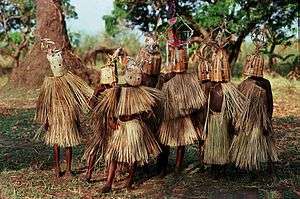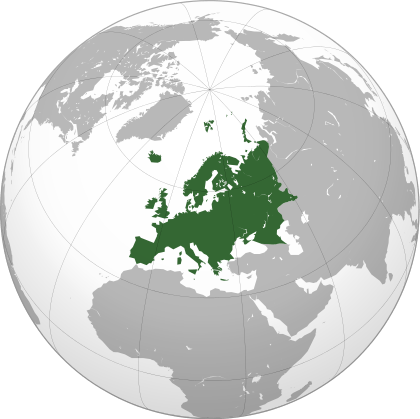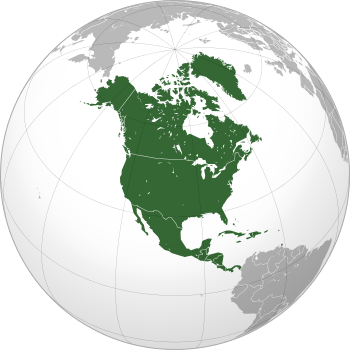Circumcision in Africa
"The distribution of circumcision and initiation rites throughout Africa, and the frequent resemblance between details of ceremonial procedure in areas thousands of miles apart, indicate that the circumcision ritual has an old tradition behind it and in its present form is the result of a long process of development."[1]
African cultural history is conveniently spoken of in terms of language group. The Niger–Congo speakers of today extend from Senegal to Kenya to South Africa and all points between. In the historic period, the Niger–Congo speaking peoples predominantly have and have had male circumcision which occurred in young warrior initiation schools, the schools of Senegal and Gambia being not so very different from those of the Kenyan Gikuyu and South African Zulu. Their common ancestor was a horticultural group five, perhaps seven, thousand years ago from an area of the Cross River in modern Nigeria. From that area a horticultural frontier moved outward into West Africa and the Congo Basin. Certainly the warrior schools with male circumcision were a part of the ancestral society's cultural repertoire.[2]
Nations In Africa Where Circumcision Occurs
All Muslims in Africa become circumcised. This remaining section covers other tribal related circumcisions as well as stigmatization of Intact men.
Kenya
In traditional circumcisions, often the same knife is used for many initiates.[3][4] This is thought to contribute to the spread of HIV.
In addition to traditional circumcision, the men of Africa enjoyed "benefits" such as young men became members of the warrior class, and were free to date and marry. The graduates became a fraternity which served together, and continued to have mutual obligation to each other for life.
In the modern context in East Africa, the physical element of male circumcision remains (in the societies that have historically practiced it) but without most of the other accompanying rites, context and programs. For many, the operation is now performed in private on one individual, in a hospital or doctor's office. Anesthesia is often used in such settings. There are tribes however, that do not accept this modernized practice. They insist on circumcision in a group ceremony, and a test of courage at the banks of a river. This more traditional approach is common amongst the Meru and the Kisii tribes of Kenya.[2] One boy in Meru County, Kenya was assaulted by other boys because they wanted him to be circumcised in a traditional ceremony as opposed to in a hospital.[5] Amongst the Gikuyu (Kikuyu) people of Kenya and the Maasai people of Kenya and Tanzania, male circumcision has historically been the graduation element of an educational program which taught tribal beliefs, practices, culture, religion and history to youth who were on the verge of becoming full-fledged members of society. The circumcision ceremony was very public, and required a display of courage under the knife in order to maintain the honor and prestige of the young man and his family. The only form of anesthesia was a bath in the cold morning waters of a river, which tended to numb the senses to a minor degree. The youths being circumcised were required to maintain a stoic expression and not to flinch from the pain.[2]
Despite the loss of the rites and ceremonies that accompanied male circumcision in the past, the physical operation remains crucial to personal identity and pride, and acceptance in society. Uncircumcised men in these communities risk being "outed", and subjected to ridicule as "boys". There have been many cases of forced circumcision of men from such communities who are discovered to have escaped the ritual. Those who do not want to be circumcised seek refuge in Kenya's police stations.[6]
Morocco
Circumcision had been performed by barbers. This is now performed by medical surgeons. Circumcision of almost two-year-old at the time prince Moulay Hassan prompted thousands of other young boys to be circumcised. The procedure is considered "purification" (t'hara) by Muslims. [7]
Rwanda
Rwanda previously had a lower rate of circumcision, similar to South Africa. Both nations have been introduced a "safe" PrePex device which claims to involves no pain nor bleeding. The Government Of Rwanda wishes to fight HIV. However, complications have occurred after a few of the circumcisions, including death. Rwanda Ministry Of Health denies that the deaths occurred from the result of circumcision.[8]
South Africa
Infant circumcision is prohibited, but some African families are performing the circumcisions illegally.
In some South African ethnic groups, circumcision has roots in several belief systems, and is performed most of the time on teenage boys:
The young men in the eastern Cape belong to the Xhosa ethnic group for whom circumcision is considered part of the passage into manhood. ... A law was recently introduced requiring initiation schools to be licensed and only allowing circumcisions to be performed on youths aged 18 and older. But Eastern Cape provincial Health Department spokesman Sizwe Kupelo told Reuters news agency that boys as young as 11 had died. Each year thousands of young men go into the bush alone, without water, to attend initiation schools. Many do not survive the ordeal.[9]
According to one article, as of December 2015, 10 million men have undergone voluntary circumcision in East and Southern Africa. since 2008.[10]
Despite the awareness raised about the negative effects of circumcision, and despite the fact that there is a strong Chinese and Brazilian influence in Africa (Neither nations generally practice circumcision.) Other organizations such as World Health Organization insist on circumcision of all African males, stating a wish to control disease. South Africa's circumcision rate is expected to increase due to the introduction of "safe" circumcision devices. Some South Africans considered boycotting the devices.[11]
Uganda
In Uganda, circumcision is performed for religious, cultural, and medical reasons. Medical related Circumcision is mainly for reduction of HIV, and STI. It is performed by non-physicians, including for infants and neonates.[12]
Zambia
In Zambia there is a circumcision programme underway because some believe it could reduce HIV.[13]
Tribes In Africa Where Circumcision Occurs
Bamasaba, or Masaba
This tribe is known for circumcising anybody, even outside of their tribe.
Bukusu
Traditional circumcision is practiced among the Bukusu people of Kenya.[14][15][16] [17] Ceremonies usually take place in August. They involve the use of mud. This is used to prevent excessive bleeding after the cut, to prevent wincing, and to commemorate a traditional legend.[18]
Gisu
The Gisu people of Uganda are closely related to the Bukusu and also practice circumcision. In Uganda, a circumcision ceremony is called Imbalu.[19][20]
Massai
Amongst the Maasai people of Kenya and Tanzania, male circumcision has historically been the graduation element of an educational program which taught tribal beliefs, practices, culture, religion and history to youth who were on the verge of becoming full-fledged members of society. The circumcision ceremony was very public, and required a display of courage under the knife in order to maintain the honor and prestige of the young man and his family. The only form of anesthesia was a bath in the cold morning waters of a river, which tended to numb the senses to a minor degree. The youths being circumcised were required to maintain a stoic expression and not to flinch from the pain.[2]
Nations In Africa Where Circumcision Does Not Occur
No nation in Africa is reported to have low rates of circumcision. Circumcision is not discouraged by medical facilities as it has been in Australia and Germany, or a usually low circumcision rate such as Japan, China, and Russia. On the contrary, most medical facilities in Africa are governed by "disease control" groups.
Tribes That Do Not Perform Circumcision
These tribes usually do not circumcise. However, many groups are campaigning these tribes to be circumcised claiming that circumcision controls disease.
Bantu
Bantu circumcisions have been declining.[21]
Luo
The Luo, the tribe Barack Obama's father belonged to, do not circumcise.[2]
Turkana
The Turkana tribe do not perform ritual circumcision.[6]
Attempts To Decrease Circumcision In Africa
Barack Obama launched a hygiene program as an alternative to circumcision. The reason why this program was launched is because Black African Males did not want to be circumcised.[22] However, this hygiene program only occurred in 2009-2010 and did not replace the circumcision efforts.
Bill Gates of The Bill Gates Foundation [23] attempted to sell condoms to Africa to reduce HIV / AIDS, although it was not directly addressing circumcision.
South Africa refuses infant circumcisions, but with mixed reception. [24] Additionally, they have boycotted "Do-It-Yourself" Circumcision devices, but only the ones made in Israel which was part of an already-existing boycott of Israel. [25]
There are organizations supporting foreskin restoration in South Africa. [26][27]
Gallery
References
- ↑ Wagner, G. (1949). The Bantu of North Kavirondo. London: International African Institute.
- 1 2 3 4 5 Marck, Jeff (1997). "Aspects of male circumcision in sub-equatorial African culture history" (PDF). Health Transition Review (7 Supplement): 337–359.
- ↑ Maino, Eric. "Traditional circumcision a health hazard". Newsfromafrica.
- ↑ Marck, Jeff (1997). "Aspects of male circumcision in sub-equatorial African culture history" (PDF). Health Transition Review (7 Supplement): 348.
- ↑ "Class 7 pupil injured after forceful traditional circumcision attempt by other boys". Youtube. Kenya Television Network. 20 August 2014.
- 1 2 http://www.independent.co.uk/news/world/africa/two-kenyan-tribes-divided-by-the-festival-of-circumcision-9664967.html
- ↑ http://www.foxnews.com/story/2005/04/15/mass-circumcision-in-morocco.html
- ↑ http://www.inyenyerinews.org/human-rights/rwanda-families-blame-circumcision-for-death-of-children/
- ↑ "South Africa circumcision deaths". BBC Online. 15 July 2003. Retrieved 2009-04-07.
- ↑ "Africa: 10 Million Circumcised in East, Southern Africa". http://allafrica.com/. 4 December 2015. External link in
|website=(help) - ↑ http://www.timesofisrael.com/south-africans-mull-penis-clamp-ban/
- ↑ Kankaka EN, Murungi T, Kigozi G, et al. Randomised trial of early infant circumcision performed by clinical officers and registered nurse midwives using the Mogen clamp in Rakai, Uganda. BJU Int. September 2016. doi:10.1111/bju.13589
- ↑ "Zambia: 7,000 Males Circumcised in Ndola". allafrica.com. 21 October 2015.
- ↑ "Circumcision rite among the Bukusu of western Kenya". Youtube. Kenya Broadcasting Corporation. 12 August 2014.
- ↑ "Bukusu Post-Circumcision Rites Continue 3 Months After 'Cut'". Youtube. K24. 21 December 2014.
- ↑ "Traditional circumcision season stirs excitement in Bukusu land". Youtube. NTV. 9 August 2014.
- ↑ "Luhya, Bukusu in Kenya". Joshua Project.
- ↑ "SAIJIKI FOR KENYA AND TROPICAL REGIONS". kenyasaijiki blog.
- ↑ "Imbalu: Circumcision Party". VICE.
- ↑ "Cut it!...Imbalu Ceremony". The Brett Diaspora Blog.
- ↑ http://www.cirp.org/library/cultural/marck/
- ↑ http://www.cnsnews.com/news/article/feds-spent-800000-economic-stimulus-african-genital-washing-program-0
- ↑ http://health.usnews.com/health-news/health-wellness/articles/2013/11/25/bill-gates-condom-campaign-an-effort-to-save-lives-in-africa
- ↑ http://www.circinfo.org/South_Africa_Childrens_Act.html
- ↑ http://www.deisi.org/pages/healthcircumcision.htm
- ↑ http://www.nocirc-sa.co.za/norm-sa-foreskin-restoration/
- ↑ http://www.questioncircumcision.com/restoration.html


.svg.png)
.svg.png)
.svg.png)
.svg.png)


.svg.png)
.svg.png)
.svg.png)
.svg.png)
.svg.png)